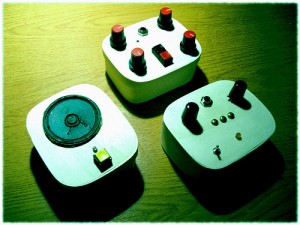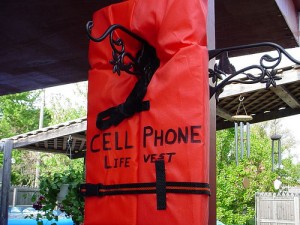 Here is the second post I wrote this week for The Secure Times, the blog of the Privacy and Information Security Committee of the American Bar Association Section of Antitrust Law.
Here is the second post I wrote this week for The Secure Times, the blog of the Privacy and Information Security Committee of the American Bar Association Section of Antitrust Law.
Two Washington State bills are addressing the issue of government surveillance using drones, and the potential negative impact this could have on privacy.
The first bill, HB 1771, is a bi-partisan bill sponsored by Rep. David Taylor, R-Moxee, which was introduced last year. It calls drones a “public unmanned aircraft system.”
HB 2789, is also sponsored by Rep. David Taylor. It calls drones “extraordinary sensing devices” and its Section 3(1) would have government use of drones “conducted in a transparent manner that is open to public scrutiny.”
Calling drones “devices” instead of “aircraft” has significance for a State famous for its aeronautic industry. Indeed, while HB 1771 passed the House last week, HB 2789 stills lingers in Committee.
A Very Broad Definition of Personal Information
HB 2789 and HB 1771 both define what is “personal information” quite broadly, as it would not only encompass a social security or an I.D. number, but also “medical history, ancestry, religion, political ideology, or criminal or employment record.”
Interestingly, it would also encompass information that can be “a basis for inferring personal characteristics” such as “the record of the person’s presence, registration, or membership in an organization or activity, or admission to an institution” or even, “things done by or to such person,” a definition that is so broad that it may encompass just about anything that ever happens to an individual. This definition recognizes that drone surveillance allows for a 24/7 surveillance society.
Personal information also means IP and trade secret information.
Illegal Collection of Data by Drones Must be “Minimized”
Under section 4 of HB 2789, disclosure of personal information acquired by a drone must be conducted in a way that minimizes unauthorized collection and disclosure of personal information. It reprises the words of Section 5 of HB 1771, only replacing ‘public unmanned aircraft by ‘extraordinary sensing device.’
I am not sure that I interpreted section 4 correctly, so here is the full text:
All operations of an extraordinary sensing device or disclosure of personal information about any person acquired through the operation of an extraordinary sensing device must be conducted in such a way as to minimize the collection and disclosure of personal information not authorized under this chapter.
So the standard it not complete avoidance of unauthorized collection of personal information, but instead minimization of illegal collection. The wording may reflect the understanding of the legislature that, because of the amazing volume of data that may potentially be collected by drones, including “things done by or to such person,” it would be unrealistic to set a standard of complete avoidance of data collection.
Maybe this ”minimizing” standard set by HB 1771 and HB 2789 is a glimpse of the standards for future data protection law…
Warrant Needed to Collect Personal Information by Drones
Under Section 5 of HB 2789, a drone could to collect personal information pursuant to a search warrant, which could not exceed a period of ten days.
The standard to obtain a warrant under Section5 (3)(c) of HB 2789 and Section 6 (2) (c ) of HB 1771would be “specific and articulable facts demonstrating probable cause to believe that there has been, is, or will be criminal activity”
Under Section 5 (3)(d) of HB 2789, a petition for a search warrant would also have to include a statement that “other methods of data collection have been investigated and found to be either cost prohibitive or pose an unacceptable safety risk to a law enforcement officer or to the public. ”
So drones should be, at least for now, still considered an extraordinary method to be used in criminal investigations. Such statement would not be necessary though under HB 1771.
Warrant could not exceed ten days under Section 5(5) of HB 2789, but could not exceed 48 hours under section 6(4)HB 1771, and thus HB 1771 would be much more protective for civil liberties. However, as we saw, it is unlikely that HB 1771 will ever be enacted into law.
Warrant Not Needed in Case of an Emergency
Both bills would authorize some warrantless use of drones.
However, under Section 7 of HB 2789 a warrant would not be needed if a law enforcement officer “reasonably determines that an emergency situation exists [involving] criminal activity and presents immediate danger of death or serious physical injury to any person,” and that the use of a drone is thus necessary.
Under Section 8 of HB 1771, it would only be necessary for the law enforcement officer to “reasonably determine that an emergency situation exists that involves immediate danger of death or serious physical injury to any person” which would require the use of drone, without requiring a pre-determination of criminal activity.
But even if an emergency situation does not involve criminal activity, section 8 of HB 2789 allows for the use of drones without a warrant if there is “immediate danger of death or serious physical injury to any person,” which would require the use of drones in order “to reduce the danger of death or serious physical injury.”
However, such use would only be authorized if it could be reasonably determined that such use of drones “does not intend to collect personal information and is unlikely to accidentally collect personal information,” and also that such use is not done “for purposes of regulatory enforcement.“
Both bills require that an application for a warrant be made within 48 hours after the warrantless use of a drone.
Fruits of the Poisonous Drone
Under section 10 of HB 2789 and section 10 of HB 1771, no personal information acquired illegally by a drone nor any evidence derived from it could be used as evidence in a court of law or by state authorities.
Handling Personal Information Lawfully Collected
Even if personal information has been lawfully collected by drones, such information may not be copied or disclosed for any other purpose than the one for which it has been collected, “unless there is probable cause that the personal information is evidence of criminal activity.”
If there is no such evidence, the information must be deleted within 30 days if the information was collected pursuant to a warrant and 10 days if was incidentally collected under section 11 of HB 2789, but would have to be deleted within 24 hours under section 11 of HB 1771.
Drone regulation is a new legal issue, but Washington would not be the first State to regulate it. Many other States have introduced similar proposals, often not successfully however. But Florida, Idaho, Illinois, Montana, Oregon, Tennessee, Texas and Virginia have all enacted laws regulating the use of drones for surveillance purposes and North Carolina has enacted a two-year moratorium. It remains to be seen if and when federal legislation will be enacted.
Source: The Secure Times
Image is last drones courtesy of Flickr user farnea pursuant to a CC BY-SA 2.0 license.




